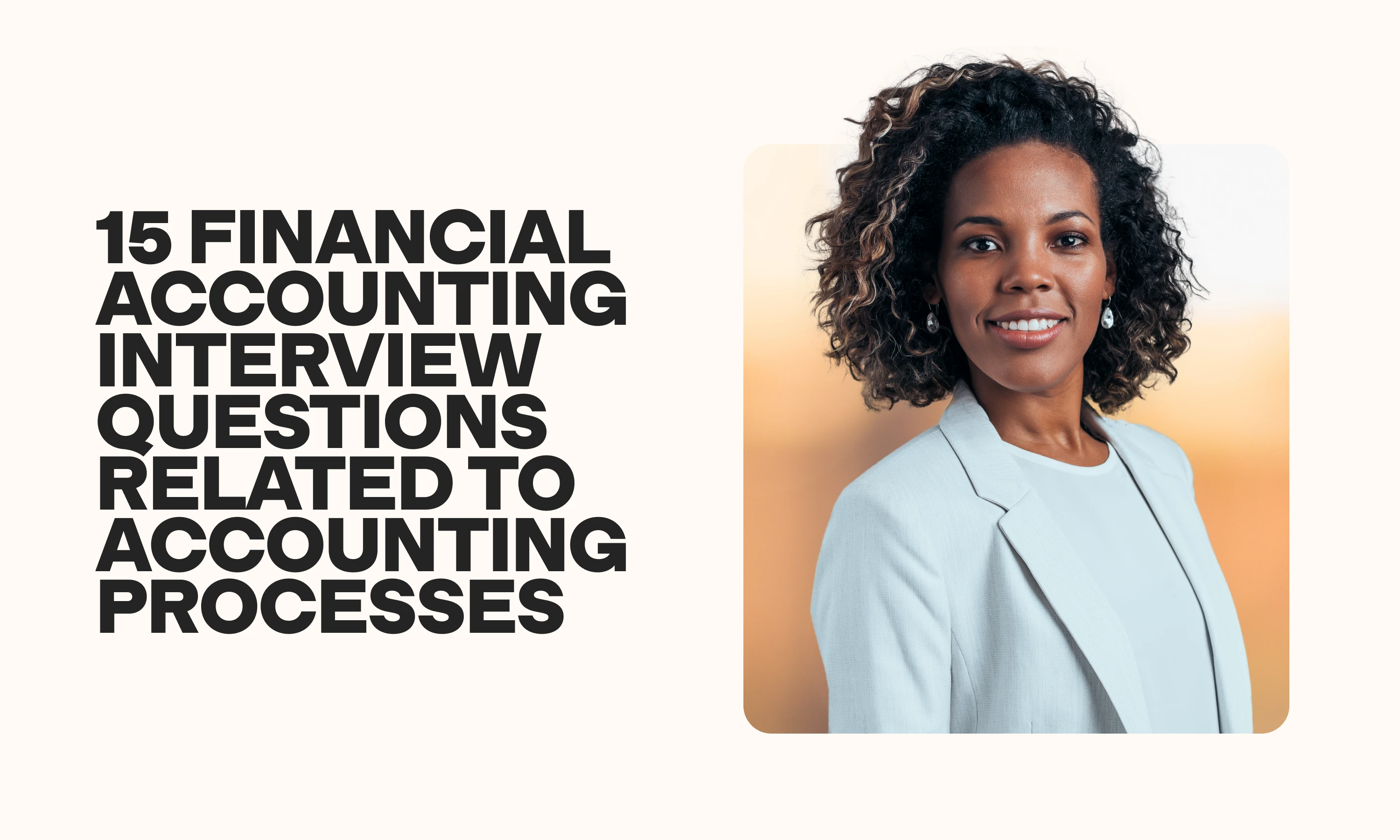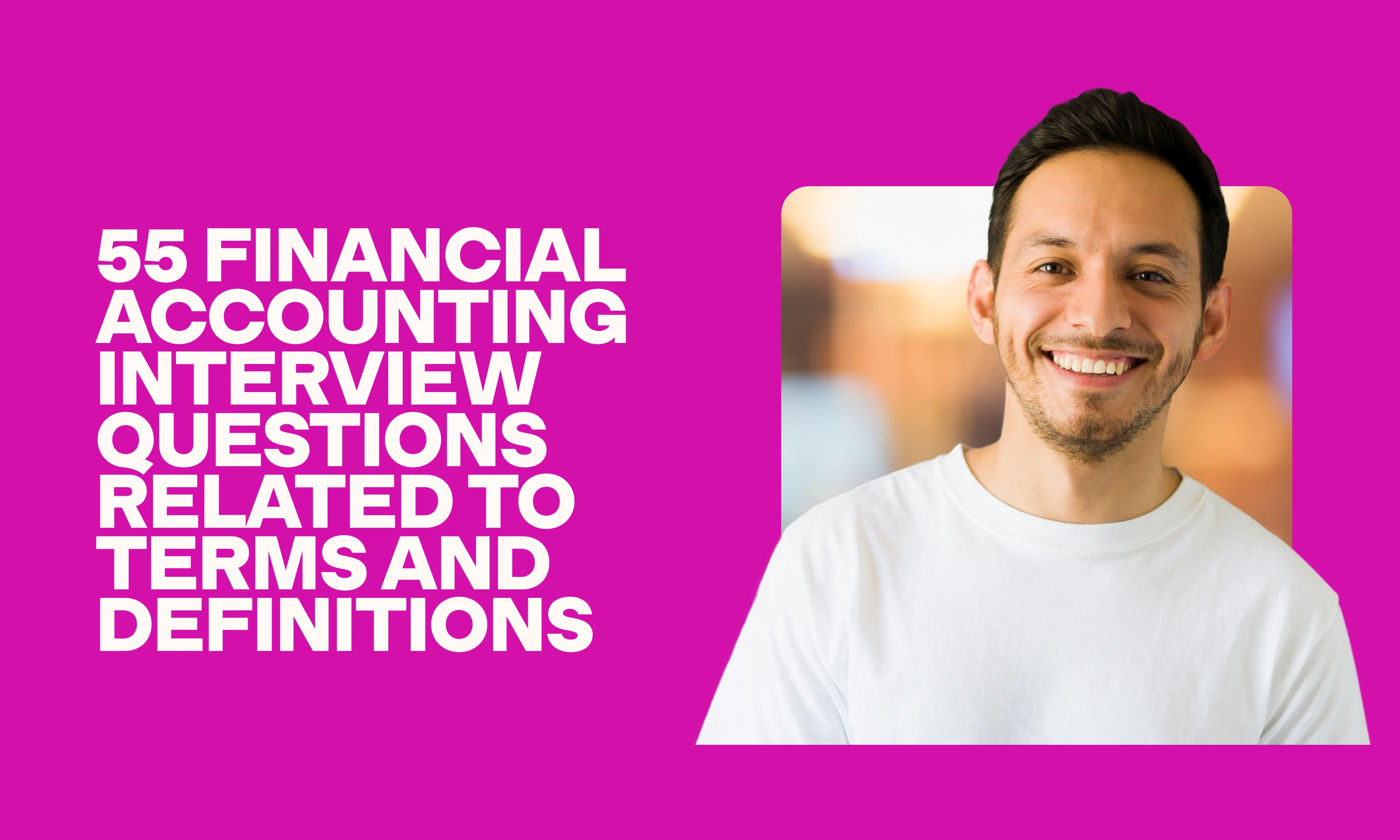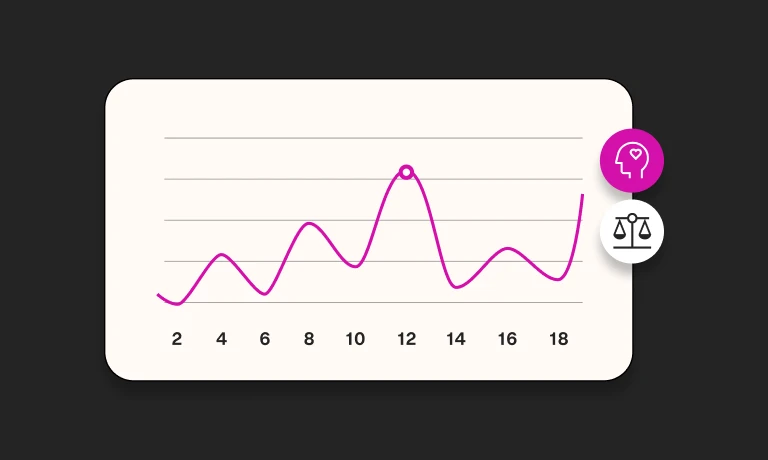100+ financial accounting interview questions
First, you must craft a great accountant or external auditor job description (depending on your role) to attract the right talent. Then, you need to assess your applicants’ financial accounting skills, soft skills, and the cultural alignment between them and your organization.
However, there are two methods at your disposal to make assessing a financial accounting expert easier: skills testing and conducting interviews.
And if you’re struggling with coming up with the right financial accounting interview questions, you’ve come to the right place: In this article, you can find 100+ questions you can use to assess your candidates’ skills, plus sample answers to 15 of them.
Table of contents
- 31 general financial accounting interview questions
- 5 general financial accounting interview questions and answers
- 15 financial accounting interview questions related to accounting processes
- 5 financial accounting interview questions and answers related to accounting processes
- 55 financial accounting interview questions related to terms and definitions
- 5 financial accounting interview questions and answers related to terms and definitions
- 5 tips for using financial accounting interview questions in the hiring process
- Hire the best candidate with the right set of financial accounting interview questions
31 general financial accounting interview questions
These 31 general interview questions are ideal for breaking the ice during the interview and getting a general idea of your candidates’ experience and knowledge.
Why did you choose a financial accounting career?
Describe your career and experience so far.
Outline three handy rules of financial accounting.
Define the different kinds of accounting.
Explain what financial accounting is.
What are your strongest financial accounting skills?
Which financial accounting skills do you need to improve?
Have you got your CPA?
Do you have any other training or qualifications related to financial accounting?
Why did you apply for this accounting role at our firm?
Why is financial accounting important for businesses?
Which hard skills are important for financial accounting professionals?
Which soft skills are important for financial accounting professionals?
Outline the five steps of the accounting cycle.
How is financial accounting different from bookkeeping?
How do you stay organized as a financial accountant?
How do you make sure to meet deadlines?
Can you tell me which institutions set the financial accounting standards you should follow?
Is it mandatory to follow accounting standards? Why?
What are the advantages of using the right financial accounting standards?
Name two reasons why organizations need to prepare financial statements.
What are the limitations of financial statements?
How is auditing different from accounting?
What are the advantages of using Excel for financial accounting?
Explain how public accounting is different from private accounting.
Name five types of intangible assets.
Name two factors that can affect cash flow.
Have you used any accounting platforms? Which ones do you prefer?
Have you ever used an ERP system? Which have you used, and which are the most useful?
How do you think AI and automation will impact financial accounting?
Have you ever had to explain a complex financial accounting concept to a stakeholder? How did you explain it in a way they could understand it?
5 general financial accounting interview questions and answers
Here’s a selection of five general financial accounting interview questions from the list above, along with sample answers you can use as a guide when interviewing candidates.
1. Which hard skills are important for financial accounting professionals?
Do your candidates know that math skills are critical for financial accounting? Can they explain which specific financial accounting skills are crucial for the role, such as recording and documenting financial details and financial analysis?
2. Which soft skills are important for financial accounting professionals?
Some essential soft skills for financial accounting professionals include excellent time-management and organizational skills. Applicants may also mention that top communication skills are vital for all accounting roles.
3. Outline the five steps of the accounting cycle.
Your candidates should know the five steps of the accounting cycle. These are:
Transaction identification and analysis
Transaction recording (in financial journals)
Transference of journal entries to accounts (posting in a ledger)
Trial balance completion and error checking
Financial reporting
4. What are your strongest financial accounting skills?
Candidates may mention many financial accounting skills when answering this question. They may explain that they have strong math skills or that their exceptional analytical skills are their best asset. Look for responses that reflect your open role’s requirements.
5. Which financial accounting skills do you need to improve?
Your candidates may describe many financial accounting skills they need to improve, such as time management or staying organized. Look for responses that demonstrate a willingness to improve these skills and a roadmap of the measures they’re taking.
The best insights on HR and recruitment, delivered to your inbox.
Biweekly updates. No spam. Unsubscribe any time.
15 financial accounting interview questions related to accounting processes
Ask your candidates some of the 15 interview questions below to determine whether they have the specific knowledge of critical financial processes that matches your expectations.
What are the most important steps when analyzing a balance sheet?
How would you analyze a company’s financial statements?
How would you calculate income tax?
How would you find out if an entry in a journal is fraudulent?
How would you estimate and calculate bad debt?
Have you ever led a team when completing a financial analysis project?
Have you ever made a financial accounting mistake? How did you correct it?
Which approaches do you use to stay up to date on financial accounting policies?
Have you ever worked remotely as a financial accounting professional? Which methods did you use to make remote work easier?
How would you ensure your client’s financial information is reliable?
How would you enhance our organization’s working capital flow?
Have you ever had a client who had positive cash flows but struggled financially? How would you explain this in financial terms?
Where would you record collected cash from customers that isn’t classed as revenue?
Which processes are involved in using a double-entry system, and when should one be avoided?
When would you report revenue in the accounting period?
5 financial accounting interview questions and answers related to accounting processes
Below, you can see a selection of five crucial questions related to accounting processes, along with sample answers you can use as a guide when interviewing candidates.
1. What are the most important steps when analyzing a balance sheet?
When analyzing a balance sheet, candidates should know that they need to:
Identify any potential liquidity problems
Identify whether the company is indebted
Check revenue and sales growth
Analyze return on investment (ROI) for assets
Monitor bottom-line growth
2. How would you analyze a company’s financial statements?
Applicants may outline the four methods of financial-statement analysis when responding to this question, which are:
The horizontal method, used as a comparative method to analyze financial information from successive periods in columns side-by-side
The vertical method, used to analyze a financial statement through percentage expressions of each item
The trend percentages method, used in a similar way to the horizontal method but for financial statement comparison over many years
The ratios method, used to express logical relationships between different items in a single period’s financial statement
3. Which processes are involved in using a double-entry system and when should it be avoided?
Some processes involved in using a double-entry system include:
Transaction recording
Final account preparation
Regular journal entry posts in the ledger accounts
Candidates may outline some disadvantages of a double-entry system and mention that the required clerical labor is substantial for using one. If an organization doesn’t have the required labor and skills, it may be best to avoid using a double-entry system as it’s also difficult to find errors in the books.
4. Have you ever had a client who had positive cash flows but struggled financially? How would you explain this in financial terms?
Can your applicants explain that companies with positive cash flows can still suffer financially if the working capital improvements are unsustainable? Do they understand that organizations can still lack sustainable income despite positive cash flows?
5. How would you estimate and calculate bad debt?
Candidates should understand that there are a few ways to estimate bad debt, including aging analysis. They may also mention that they could calculate the percentage of bad debt by dividing the bad debt amount by the total accounts receivable and multiplying this by 100.
55 financial accounting interview questions related to terms and definitions
The 55 financial accounting interview questions in this section relate to critical terms and definitions used in the field, and will help you evaluate your applicants’ knowledge.
Explain what financial statements are.
Can you explain what a profit and loss account is?
Can you explain what a balance sheet is?
Can you explain what a cash flow statement is?
Explain what conservatism means in financial accounting.
Outline the key constraints on reliable financial statements.
Explain the fundamental financial accounting equation.
Explain what accounts receivable is.
Explain what accounts payable is.
What is goodwill in accounting?
Explain what deferred revenue expenditure is.
Explain what contingent liabilities are.
Explain what depreciation is.
What is the straight-line depreciation method?
What is the declining balance depreciation method?
What is the SYD depreciation method?
Explain the units of production depreciation method.
Explain what marketable securities are.
Explain what current assets are.
Explain what loans are.
Explain what an advance is.
Define fixed assets.
What is an investment?
Explain what share capital is.
Explain what a funds flow analysis is.
Explain what an unsecured loan is.
Explain what a secure loan is.
Explain what miscellaneous expenditures are.
Explain what income tax is.
Explain what an assessment year is.
Explain what a tax refund is.
What are capital gains?
What does deferred tax mean?
What is a revenue transaction?
What is a capital transaction?
Explain what double-entry bookkeeping means.
How are trial balances different from balance sheets?
Explain what SAP memory is.
Explain what Microsoft Accounting Professional is.
What is an inactive account?
What is a dormant account?
Explain the dual aspect principle in financial accounting.
What is a journal?
Explain what a compound journal entry is.
Explain what a general ledger account is.
Explain what accumulated depreciation is.
Explain what depreciation expense is.
What are accrued expenses?
What are accrued revenues?
Explain what bad debt expenses are.
What is amortization?
Explain what a liability is.
What are provisions in financial accounting?
What are reserves?
Explain what accruals are.
5 financial accounting interview questions and answers related to terms and definitions
Use the sample answers in this section as a guide when assessing your candidates’ responses to this selection of five of the interview questions from the above list.
1. Explain the dual aspect principle in financial accounting.
The dual aspect principle in financial accounting indicates that all business transactions should have double-entry bookkeeping due to the dual nature of each transaction. For example, during any purchase, the organization trades cash for the item they require and then receives it, which underpins the dual aspect principle in financial accounting.
2. Explain what Microsoft Accounting Professional is.
Microsoft Accounting Professional is an accounting software that makes accounting transaction processing easier and helps professionals save time.
3. What is the straight-line depreciation method?
The straight-line depreciation method involves estimating the useful life of an asset and the salvage value at the asset’s life end. It involves using the following formula:
Depreciation = (asset cost – salvage value) / asset useful life
4. What is the declining balance depreciation method?
The declining balance depreciation method involves reducing tax exposure by writing off the depreciation costs of an asset. It involves using the following formula:
Depreciation = the current book value x the rate of depreciation
5. What is the SYD depreciation method?
The SYD depreciation method, or also sum-of-the-years digits method, uses the following formula:
Depreciation = (remaining lifespan / sum of the years digits) x (cost of asset – salvage value)
5 tips for using financial accounting interview questions in the hiring process
Now that you have a comprehensive list of financial accounting interview questions, here are five tips for using them during your hiring process.
1. Ask applicants to complete a skills assessment before you move on to the interview phase
If you’re unsure whether to start with skills testing or interviews, we advise you to always begin with skills testing.
Screening out unqualified applicants is much easier with a pre-employment skills assessment, as it takes much less time and effort on your side, compared to interviews. You can then select the best candidates based on their test results and invite them to an interview.
2. Create your financial accounting interview questions list with the skills test results in mind
In this article, you have a comprehensive list of financial accounting interview questions you can use, but nothing is stopping you from building on it.
You can use your applicants’ skills assessment results to add extra questions or adjust the questions to create a list that better suits your organization.
For example, if your applicants have no experience with the financial accounting software your organization is using, this is the perfect time to ask how they would tackle this and learn how to use it.
3. Take notes (and let applicants know that you’ll be doing this)
During the interview, you may choose to take notes of your applicants’ responses. This is a good method to help you review all responses at the end, but make sure you tell your applicants that note-taking will be a part of the interview process.
4. Use scoring sheets during the interview
Scoring sheets (also known as scorecards) are good options for recording applicants’ responses and scoring them using an efficient system.
To integrate scoring sheets seamlessly into your hiring process, make sure that you have a list of the skills you’re looking for. Also, make reviewing efficient by using identical scorecard templates for every candidate.
5. Consider interview results to create tailored onboarding sessions
One great way to ensure you give new hires the right training is to consider their interview responses to the financial accounting interview questions above.
If you have any doubts about weaker areas, integrate these into a comprehensive training program that helps them build the skills they lack. You can also use an onboarding checklist to define and develop your training program.
Hire the best candidate with the right set of financial accounting interview questions
The easiest method to evaluate the skills of your candidates for a financial accounting role is to build a comprehensive skills assessment and interview your applicants.
As part of the skills assessment, remember to include an Accounting test to assess your applicants’ specific accounting skills. You can also use a Financial Accounting (IFRS) test to complete the first one, along with other skills tests, based on your requirements for the role.
You can then invite your most promising candidates to an interview, in which you can use the financial accounting interview questions we've outlined and behavioral questions specific to finance roles to learn more about them.
Hiring doesn’t have to be complicated. For the best results, use TestGorilla’s skills tests and ask the right financial accounting interview questions to hire the right professional for your accounting role.
You've scrolled this far
Why not try TestGorilla for free, and see what happens when you put skills first.

















